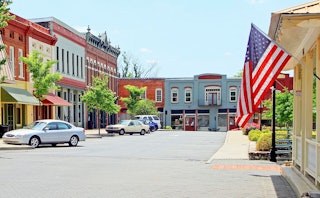8 Things Only People From Small Towns Understand

Here is what I learned:
1. Opening day is an event.
Did ya hear? They are openin’ that Wal-Mart in Lewisburg today? Whether it is the opening of a McDonald’s, Dairy Queen or a large, discount store, opening days are events in their own right—and events you plan to attend. You mark your calendars and plan to be there when the doors open, even if the establishment opening is two towns, and 30 minutes, away. Other noteworthy opening days include the first day of fishing season, hunting season and growing season. (In fact, in most small towns, these are actually school holidays or, at the very least, count as an excused absence.)
2. Banks are known as credit unions.
Before TD, Wells Fargo and Bank of America, most towns had credit unions (member-owned financial institutions). They function much like their corporate counterparts and handle many of the same banking and lending services, but they differ in that those who have accounts are members/part-owners, meaning they have say in the company’s overall operations. Sounds snazzy, right? It is, and lucky for those living in small towns, credit unions are still the primary banking establishment—just make sure to take care of all of your financial needs before 3 p.m. on Friday, otherwise you are S.O.L. until Monday morning.
3. Gas stations are the place to be on a Saturday night.
While they vary from the very simple two pump and a Pepsi machine sort of station to the more elaborate Sheetz-style establishment (a Northeastern fueling station/convenience store), gas stations are the place to go if you want to be seen. Not only can you fill your tank, but you can fill your soul with the latest gossip, exchange ideas and cigarettes while discussing the current political climate, or sit there and wait—hoping Tina will drop by and you can ask her on a date.
4. Everything is shut down on Sunday.
Aside from church and the grocery store, and—if you’re lucky—those chains I mentioned earlier, everything is closed on Sunday. Period.
5. Not all words are as they appear.
The true marker of a small-towner is in the lingo, which is true for any locale but especially true in rural areas. While we don’t all say “y’all” or “youse” or “dang,” “dern” or “kin,” it is highly likely we will refer to a creek as a “crik,” call potatoes “taters” and order subs as “ho-gEEs” or “po’ boys.”
6. Trick-or-treating can take all night.
I didn’t truly appreciate trick-or-treating until I spent four hours scaling hills in the snow (yes, snow!) just to get 15 or 20 pieces of candy. Why so long, and so little candy? Many rural residents own large plots of land and, if you live in a farming area, that means there are acres between you and your nearest neighbor. (It also means that mailmen drive from house to house—and can actually drive five minutes or more before finding a roadside box.) Since trick-or-treating isn’t the same from the backseat of a minivan, we walked uphill, and in the snow, on more than one occasion—and yes, it was always uphill.
7. Directions are given using time and landmarks.
While city dwellers give directions according to bridges, highways and, more frequently, subway stops, those who live in a small town know the true way to advise drivers is through landmarks. We are about 30 minutes away, right over the Susquehanna. Yeah, you’ll know it when you see it. Just turn right at the beer barn. Oh, but if you pass the laundromat/tanning salon, you’ve gone too far, and whatever you do, don’t use a GPS—Google Maps doesn’t have these mountain roads figured out just yet.
8. And, of course, everybody knows everyone—and everything.
Whether you come from a town of 300 or a booming 5,000, everybody knows everyone else (or, at the very least, you know their business). Neighbors have no problem popping over, and I’ve heard teachers gossiping more than teenage girls. So whether you missed mass last Sunday or were caught making out with your boyfriend-of-the-week in Farmer John’s cornfield, in the woods or beneath the bleachers (does anyone actually do this?) you can be sure Sister Mary and Gloria—your second cousin, once removed—will know about it by sunrise.
This article was originally published on